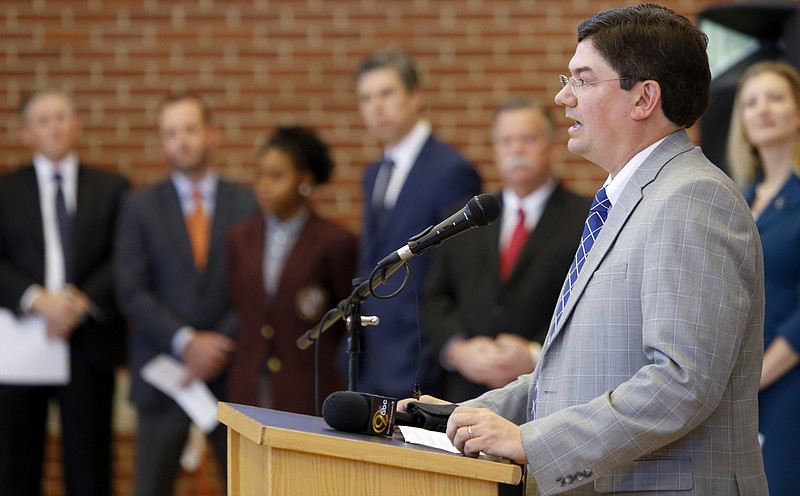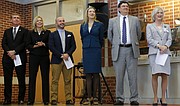Photo Gallery
Hamilton County Schools, community partners launch massive effort to get students prepared for workforce
A new effort aims to prepare area students for life after high school.
Known as the Future Ready Institutes, the program, unveiled Thursday, is a partnership between Hamilton County Schools, Chattanooga 2.0 and community business partners.
The brainchild of Superintendent Bryan Johnson, who began championing the idea soon after he took the helm of the district last year, the institutes will be small learning communities embedded in 11 of the county's traditional high schools, with some hosting more than one institute. The 17 institutes will each be centered around an industry theme, such as health sciences, engineering, industrial manufacturing and hospitality.
"It's exciting for me to see what is the biggest initiative in three decades in Hamilton County Schools," said Jared Bigham, executive director of Chattanooga 2.0. "It is unlike any of the work that has been done before."
The schools and their institutes
Brainerd High SchoolThe Institute of First Responders and Forensic ScienceThe Institute of AviationEast Hamilton High SchoolThe TIE Institute: Tinker, Innovate, EngineerThe CLIMB Institute: The Canes Leadership Institute of Marketing and BusinessEast Ridge High SchoolThe Institute of Building and DesignHixson High SchoolThe Institute for Integrative Agriculture, Food, Natural Resources and TechnologyThe Institute for Health Careers and Medical AdvancementThe Howard SchoolErlanger Institute for Healthcare and InnovationThe Institute of Hospitality and TourismOoltewah High SchoolThe Institute of International Baccalaureate StudiesRed Bank High SchoolThe Institute of Computer Sciences and EngineeringSequoyah High SchoolThe Institute of Industrial ManufacturingThe Institute of Digital Arts, Design, and ProductionTyner High SchoolThe Institute of Technology and SecurityThe Institute of Teaching and LearningSignal Mountain High SchoolThe Institute of International Baccalaureate StudiesSoddy Daisy High SchoolThe Institute of Tech Start-Ups and Web Design
Erlanger Health System, Unum and JP Morgan Chase are among the initial business partners, alongside the University of Tennessee at Chattanooga and Chattanooga State Community College, which have been instrumental in the institutes' launch.
Because of these partners, the initiative has so far been "budget neutral," Johnson said. This year, the district has only paid for half the salary of the institutes' director, Blake Freeman, thanks to a grant from JP Morgan Chase. Meanwhile, initial professional development and training for institute teachers this summer will be covered by Unum, which committed $100,000 a year for the next three years toward teacher training.
The business partnerships aren't just about providing funds, most of the stakeholders emphasized.
"That proactive engagement from the business community is really critical. The schools, they do their best to understand what business and employer needs are in the community, but we in the business community must engage and be proactive and share those stories," said Christy Gillenwater, CEO of the Chattanooga Area Chamber of Commerce. "And it's so much more powerful for students and faculty to actually see some of what is needed in the business world today."
Many of the partners feel the institutes are the big push that is needed to bridge the gap between education systems and the business industry.
"This is an important moment for 2.0," said UTC Chancellor Steve Angle. "We're committed, we're all in. If this fails, it's on us. ... The Future Ready Institutes are giving us a real solid place where we can all come together, and it also gives us an example of what can be done."
Workforce development has been a key issue in Hamilton County since Chattanooga 2.0 launched in 2015. The district has worked for years to expand post-secondary options for students as it heard local business leaders' concerns that they were not able to recruit a skilled workforce from the local population.
In 2015, a Chattanooga 2.0 report found that around 15,000 jobs in the country were not being filled by Hamilton County residents based on education requirements alone - almost 65 percent of graduates of the Hamilton County Schools system failed to earn any education past high school, leaving them unqualified for those jobs, data showed.
These institutes are intended to tackle that.
"We know that in order for the community to thrive, it has to be intentional with education," Johnson said. "How can you do that when you're not engaging business and industry in what they really need, asking what are the jobs of tomorrow and the vacancies of today and what are the real-world problems we can use today."
Students in each institute will not only be exposed to career and technical education courses that have already existed in each of Hamilton County's high schools, but will also have opportunities for job shadowing, mentoring and even possible internships with business partners. Students will also be able to earn industry certifications and take dual enrollment and dual credit classes, which are vital under new accountability measures under the Every Student Succeeds Act (ESSA) federal education law, which includes assessing schools based on the early post-secondary options they provide students.
"This is going to bring so many opportunities to our students. They're going to be a part of a very experiential engagement process with really hands on opportunities. We know that is the best way to teach students," Freeman said. "We are excited about exposing students to career themes as they enter high school and think about their lives."
School officials are currently directing efforts toward recruiting students for the institutes, which will open in August. The targeted goal is to have 100 freshman students in the first year at each institute, adding another 100 each year afterward - with about 400 students enrolled in an institute at any given time. Students will still take traditional classes in four core areas - English, math, science and social studies - in addition to the career and technical courses, and teachers will plan lessons around student projects across all subject areas.
Students and families are not limited to their zoned schools either, district officials say. About half of the seats at each school will be open to all Hamilton County students, though transportation is still a barrier the district is working through.
"There's this ever-growing tension in public K-12 education: do we help to reproduce or reduce that social class barrier? So we are really trying to increase access to these opportunities," said Nakia Towns Edwards, Hamilton County Schools chief of staff. "What we've got to do is ensure that students across the spectrum, regardless of their socioeconomic background, are aware of these opportunities and that we are giving them the ability to opt-in to those opportunities."
School officials are candid about some of the kinks that still need to be worked out - how to get students to a school for which they aren't zoned, communicating what the institutes have to offer to eighth-graders and their parents this spring in time for them to apply, and getting teachers on board as they shift how they plan their lessons and curriculum at each institute.
"We feel strongly that this will have a direct effect on school performance," Johnson said.
Other school district officials are just as hopeful.
"This is the first step in a series of steps, and people will see that Hamilton County Schools are the best choice," Towns Edwards said.
Contact staff writer Meghan Mangrum at mmangrum@timesfreepress.com or 423-757- 6592. Follow her on Twitter @memangrum.
More info for Hamilton County students
The district is holding an information night for parents and families of current eighth-graders interested in applying to a Future Ready Institute at 6 p.m. on Tuesday, April 17, at Unum, 500 Walnut St. Info nights are also planned for each Future Ready Institute school site. For more information, visit www.hcde.org/futureready.

